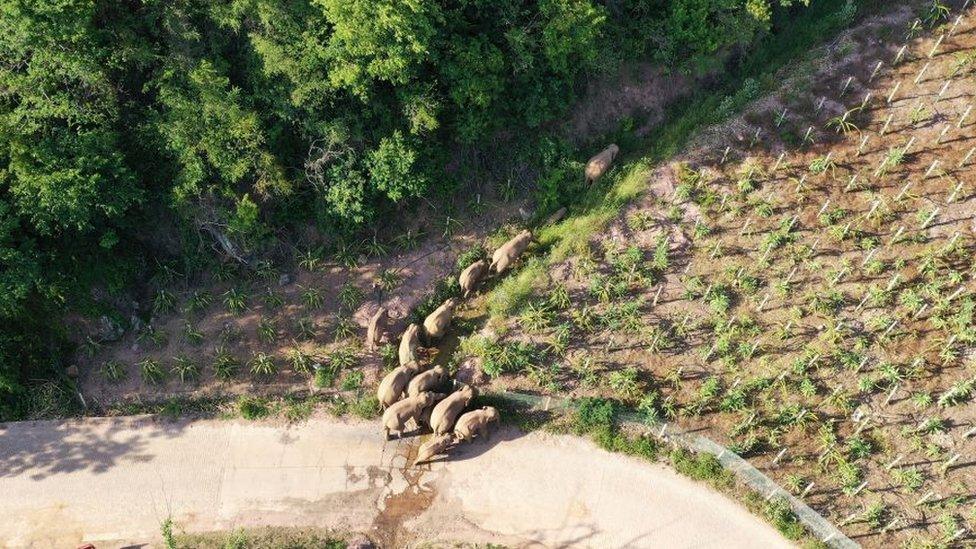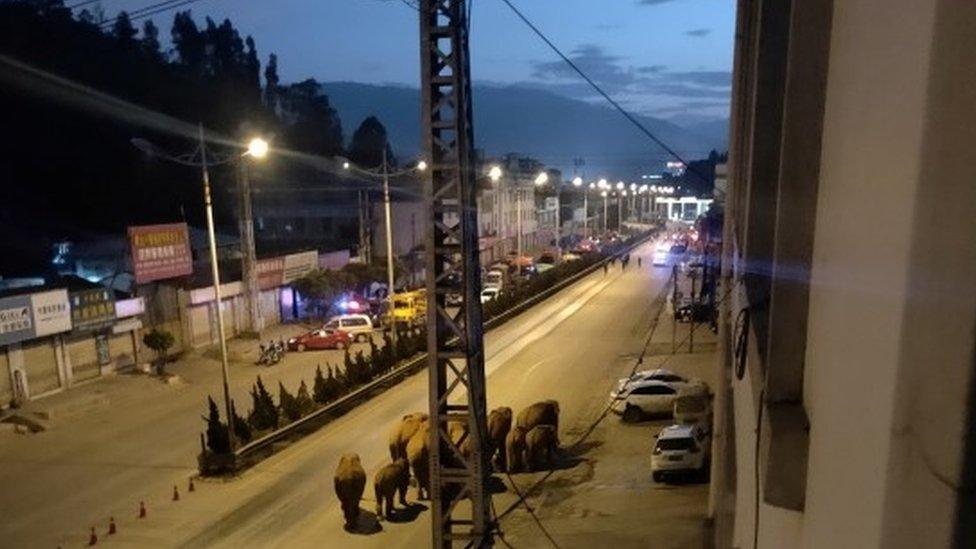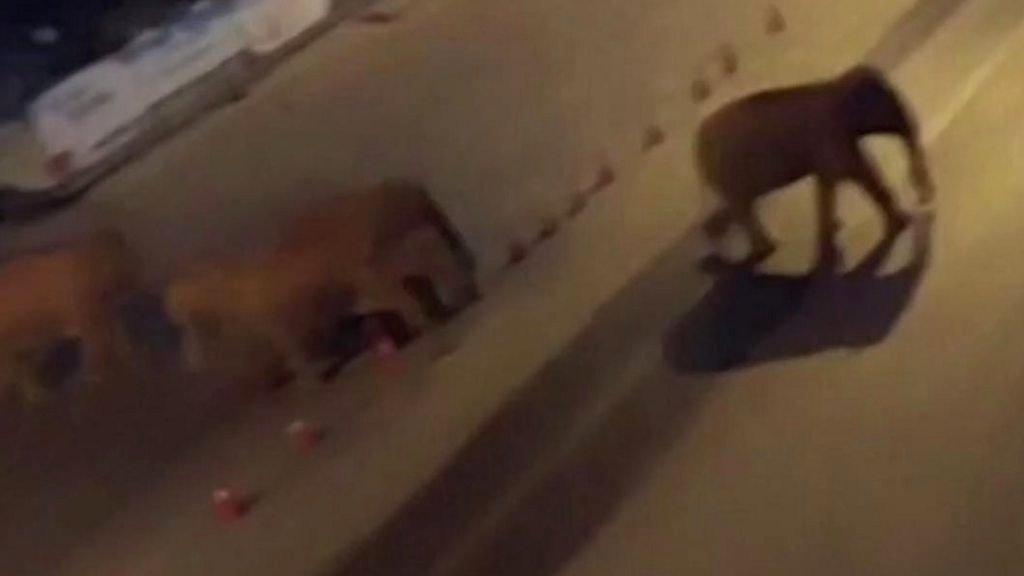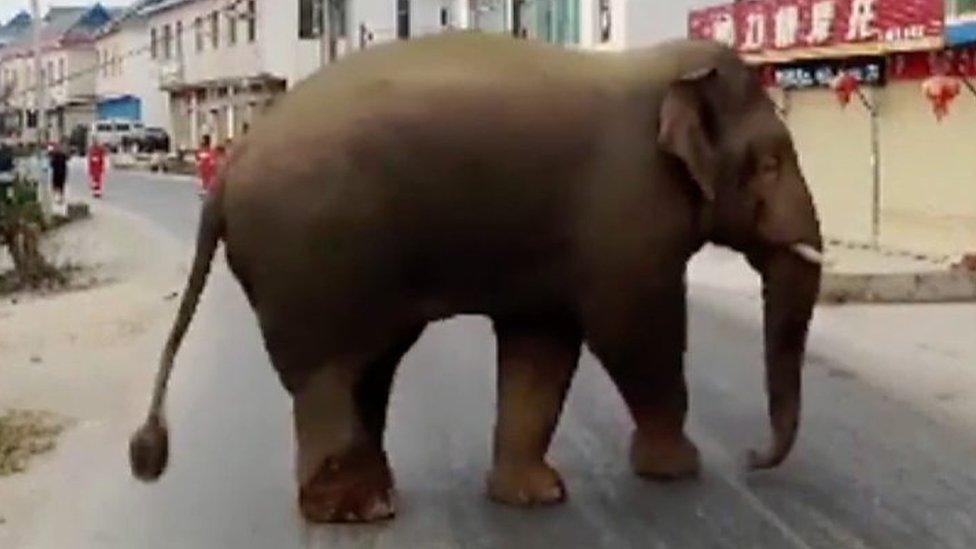China elephants: Herd on mammoth 500km trek reaches Kunming
- Published
The elephants have been filmed in a number of Chinese cities
A herd of elephants that packed its trunks for an unexpected 500km (300 mile) trek has arrived at a Chinese city where millions of people live.
The 15 elephants have been hoovering up crops and poking their noses through doors on the march from the south of Yunnan province to its capital Kunming.
A big effort - with tonnes of food - is under way to try and keep them safe.
It is unclear why they left their habitat to embark on the journey, which has captivated residents and experts.
Some have suggested an inexperienced leader may have led the herd astray, while other believe the elephants could be searching for a new habitat.
The Asian elephant is an endangered species. China has only about 300 wild elephants, mainly in the south of Yunnan province.
Scientists say this is the furthest any of the wild elephants there have travelled from the habitat.
The Kunming Daily says the cities of Kunming and Yuxi deployed almost 700 police and emergency workers armed with 10 tonnes of corn, pineapples and other food. They were backed up by trucks and drones to try to divert the animals on to a safe path.
Don't gawk or leave corn or salt out; keep your distance and don't disturb them with firecrackers, residents have been told.

The journey has comprised a mixture of farms, tracks and asphalt and has continued night and day
Animal experts say the herd appears to have gathered pace, possibly because the heavier human population has increased its fears, and it is unlikely the elephants would try to enter Kunming.
Efforts to turn them around have failed, and scientists may have to try and find them a suitable place to live nearby.
Tale of the journey
It's not exactly clear when the herd left home, which was probably the Mengyangzi Nature Reserve in Xishuangbanna, in south-west Yunnan.
Officials appear to have been first alerted to their movements when locals spotted the herd about 100km north of Xishuangbanna in April.


There were thought to be 17 elephants initially, but two appeared to turn back when reaching Mojiang county. Other reports say it was 16 originally but a newborn calf helped the number back to 15 once the two abandoned the trek.
As for the journey, it has comprised a mixture of farms, tracks and asphalt and has continued night and day.
At one stage the group took a main road through the village of Eshan and apparently banged on residents' doors.
A video on social media showed people running down the street shouting "they are coming", followed soon after by a police car and the elephants, the South China Morning Post reported.
A Yunnan government notice said the herd had "caused trouble 412 times" there.
Stories abound, including of one elderly man who the Jimu News channel said had hidden under his bed in his retirement home as trunks were poked into rooms.
At least one elephant got drunk on fermented grain in a report that is - naturally - quite difficult to confirm.
And more than $1m (£710,000) worth of crops has been pilfered along the way. Fortunately, no one has been injured.
One report says the herd is made-up of six female and three male adults, three juveniles and three calves.
Why did they leave?
There was some dry humour on social media in China. One post on the Weibo social media site said the animals probably wanted to attend the UN Biodiversity Conference meeting in Kunming. They are a bit early, as it isn't taking place until October.

The herd took a main road through Eshan
But this is a serious issues too - involving habitat loss and increasing altercations between elephants and farmers in Yunnan.
Li Zhongyuan, a Xishuangbanna forestry official, told the Global Times that the traditional diet of the elephants had depleted in their habitat, with the animals now changing to agricultural crops like corn and sugar cane.
There could be similar treks if the habitat is reduced further by the planting of rubber and other cash crops.
Related topics
- Published1 June 2021

- Published4 March 2015
- Published26 March 2019
